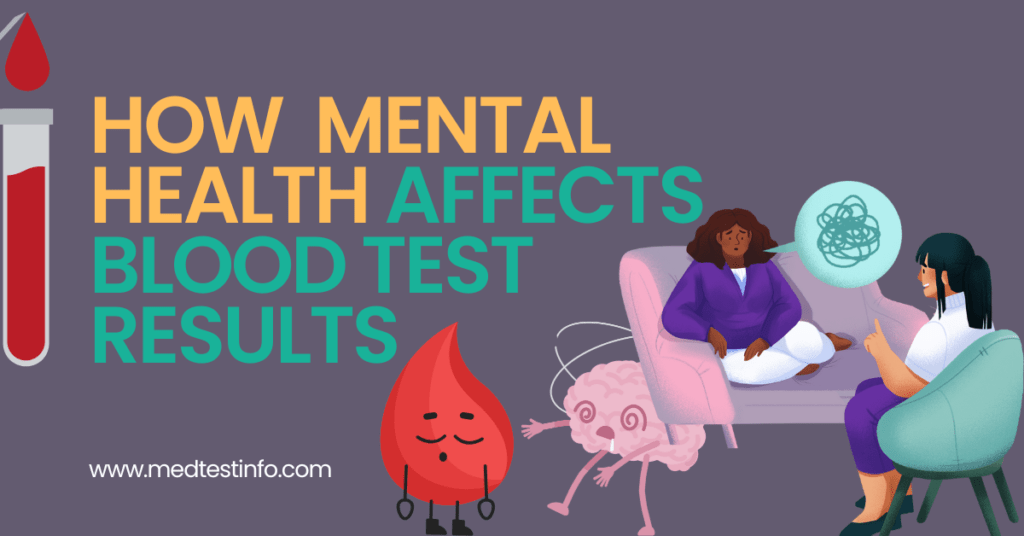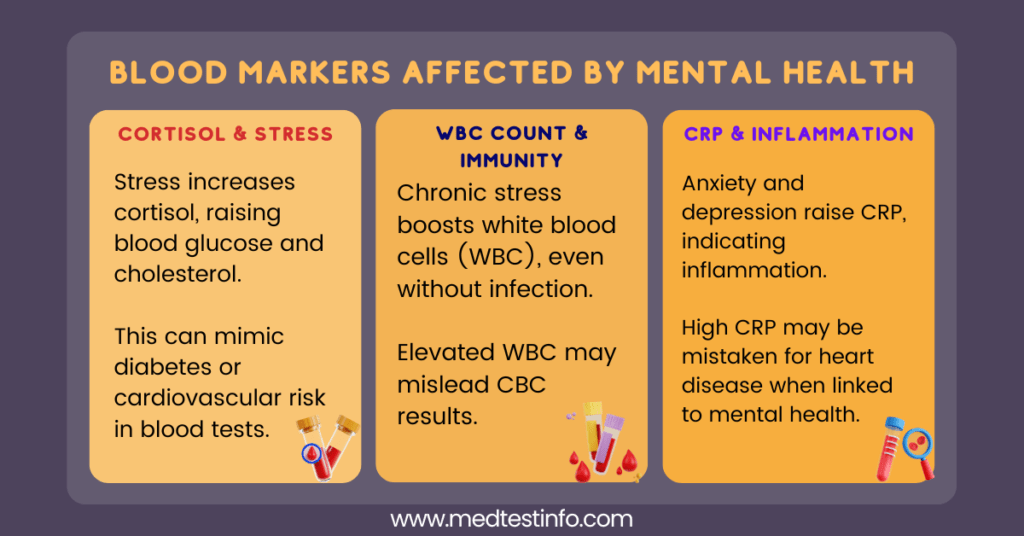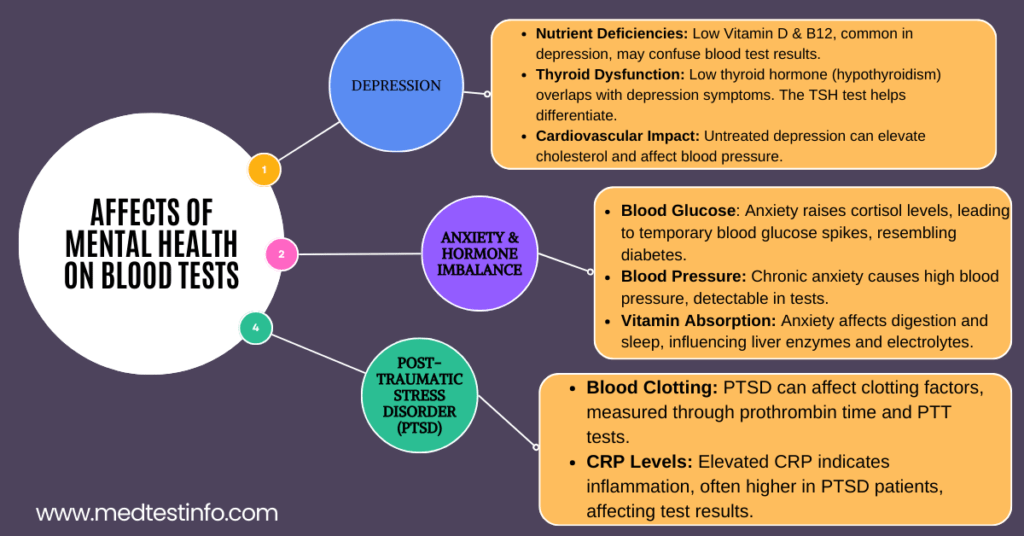
Overview
We all know mental health can impact our mood, thoughts, and behaviour, but did you know it could also influence the results of your blood tests? Blood tests are standard diagnostic methods used to evaluate various aspects of your health, but your emotional state might influence the results. Chronic stress, anxiety, depression, and other mental health problems can affect blood markers, resulting in inaccurate or misleading results. This article investigates how mental health affects blood tests. It examines how mental health affects the components of blood tests. Furthermore, it explains why it is crucial for doctors to consider mental health during diagnosis.
Mind-Body Connections And Blood Tests
The connection between the mind and body is powerful. Stress, anxiety, depression, and other mental health issues can all result in significant physiological changes in the body. These changes frequently appear in blood test results
When you are under stress, your body enters "fight or flight" mode, releasing stress hormones such as cortisol and adrenaline. While these hormones are necessary for short-term survival, they can cause long-term health issues if levels remain elevated. Chronic stress can alter various blood test markers over time, making it harder to understand your health accurately.

Significant Blood Markers Affected By Mental Health
Cortisol Levels And Stress
Cortisol is commonly known as "stress hormone". The adrenal gland secretes it in response to stress. Elevated cortisol levels can disturb numerous body processes and affect blood test results. For example, elevated cortisol levels can:
Increase blood glucose: Cortisol causes the liver to release more glucose, increasing blood sugar levels. This can resemble diabetes or pre-diabetes.
Raise cholesterol: Chronic cortisol release can raise cholesterol levels, increasing the risk of cardiovascular disease.
These changes can affect the findings of blood tests such as lipid panels and fasting blood sugar levels. Doctors must consider the patient's mental health when evaluating increased glucose or cholesterol results.
White Blood Cell (WBC) Count And Immune Function
Mental health issues, particularly persistent stress, can negatively impact the immune system. Elevated stress levels can raise the white blood cell count (WBC) as the body prepares to defend against potential threats. This could impact CBC (Complete Blood Count) values, which are routinely used to diagnose infections, immunological diseases, and inflammation.
Individuals experiencing persistent stress, for example, may have an elevated WBC count even when no infection is present. This demonstrates the need to consider mental health when evaluating immune system-related blood test results.
CRP And Inflammation
Depression and anxiety are connected with increased levels of C-reactive protein (CRP). CRP acts as an indicator of inflammation within the body. Inflammation is becoming more prevalent in chronic disorders such as heart disease, but it is also related to mental health issues.
High CRP levels may mislead healthcare practitioners into believing you have cardiovascular problems when the underlying cause could be mental health-related inflammation. Doctors can prevent making incorrect diagnoses by taking into account mental health problems.

How Specific Mental Health Conditions Affect Blood Tests
Depression
Depression can affect a variety of biomarkers in blood tests. For example:
Nutrient deficiencies: People who suffer from depression frequently have inadequate nutrition or poor vitamin and mineral absorption. Vitamin D and B12 deficiencies are frequent among depressed people. Blood tests can reveal these deficiencies and may lead to confusion with other medical issues.
Thyroid dysfunction: Depression is linked to thyroid abnormalities. Low thyroid hormone levels (hypothyroidism) can lead to fatigue, weight gain, and depression. This overlap can make it hard for a doctor to tell if the symptoms are due to depression or if they are caused by thyroid dysfunction. A specific test, like the TSH test, must differentiate between the two conditions. The TSH test measures the level of thyroid-stimulating hormone in the blood, which helps determine if thyroid dysfunction, like hypothyroidism, is present.
Untreated depression can also have an impact on the cardiovascular system, resulting in greater cholesterol levels and changes in blood pressure, which may be visible in lab findings.
Anxiety And Hormone Imbalance
Anxiety issues can significantly affect your blood test results. Chronic anxiety increases the body's stress response, resulting in elevated levels of cortisol and adrenaline. It has multiple implications.
Blood glucose levels: Anxiety can cause temporary blood glucose rises, which mimic diabetes symptoms.
Blood pressure: Anxiety is also connected to high blood pressure, which can be identified with a simple blood test that assesses kidney and liver function.
Furthermore, anxiety is frequently associated with gastrointestinal issues and insufficient sleep, both of which can impair vitamin absorption and the body's capacity to metabolize meals. This, in turn, can affect some blood indicators, including electrolytes and liver enzymes.
Post-traumatic Stress Disorder (PTSD)
PTSD is a severe mental health disease that can affect blood test results. Persistent inflammation and physiological abnormalities, such as high cortisol levels, often occur with PTSD. This may cause:
Blood clotting changes: PTSD can influence blood clotting factors, which can be detected in blood tests that measure prothrombin time and partial thromboplastin time (PTT).
Increased CRP levels: PTSD patients frequently have higher CRP levels, indicating more significant inflammation throughout the body.
These physiological changes can mislead blood test results and lead to inaccurate diagnoses if doctors do not evaluate PTSD.
Antipsychotic Medication And Its Effect On Blood Test Results
Many drugs used to treat mental health disorders can affect blood test results. Some typical medicines are:
Antidepressants: Medications such as SSRIs (Selective Serotonin Reuptake Inhibitors) can change liver function and electrolyte balance, as evidenced by laboratory tests.
Antipsychotics: Used to treat severe depression or psychosis, antipsychotics can increase blood sugar levels and alter lipid profiles, raising the risk of diabetes and cardiovascular disease.
Benzodiazepines: Doctors commonly use these medications to relieve anxiety. They can impair liver and renal function, leading to regular blood test abnormalities.
When interpreting lab results, doctors must consider any medications the patient is currently taking. These medicines can significantly impact essential blood parameters.
Consideration Of Mental Health In Blood Test Interpretation
Mental health has a significant impact on blood test results. Stress, anxiety, depression, and other mental health issues can disrupt hormones, immunological responses, and metabolic processes. Healthcare providers may misinterpret blood test results without considering mental health, leading to inaccurate diagnoses or unnecessary treatments.
For example, if a blood test indicates elevated glucose levels but the patient is under a lot of stress, it could be a short-term reaction to the stress rather than a symptom of diabetes. Similarly, elevated cholesterol levels may be the effect of prolonged stress or medication use rather than a clear indicator of cardiovascular disease.
Thus, knowing the function of mental health in blood test interpretation is critical for giving accurate diagnoses and effective treatment plans. By considering mental health and physical symptoms, healthcare practitioners can provide better patient care.
Conclusion
Mental health disorders have an impact on more than simply mood and behaviour; they can also influence blood test results. Chronic stress, anxiety, depression, and PTSD can all affect important biomarkers, resulting in misleading results. To ensure accurate diagnosis, healthcare providers must include the patient's mental health history while interpreting blood tests.
Understanding how mental health influences blood test results enables patients to collaborate with their healthcare professionals to address any underlying issues and avoid misdiagnoses. To provide the best possible care, it is necessary to treat the body as a whole, taking note of both physical and mental health.
Mental health is significantly connected to physical health; blood tests are essential for detecting potential health issues. With the proper context, blood test results can provide a more complete picture of overall well-being, resulting in improved treatment outcomes.
Frequently Asked Questions (FAQs)
Yes, stress has a significant effect on blood test results. It raises blood sugar, cholesterol, and blood pressure by releasing the chemicals adrenaline and cortisol. Chronic stress can also increase inflammatory indicators like CRP (C-reactive protein). As a result, even if illnesses such as diabetes or heart disease do not exist, test results may indicate them. Healthcare practitioners frequently take stress levels into account when evaluating these findings.
Mental health, particularly chronic stress and worry, can affect white blood cell (WBC) levels. Stress stimulates the immune system, which causes the body to create more WBCs. This can result in high WBC counts, which are frequently associated with infections or inflammation. In certain circumstances, elevated WBC counts may not indicate a medical condition but rather the body's reaction to psychological discomfort. Monitoring patients' mental health can help clinicians understand these changes.
Yes, a lack of sleep can affect many blood indicators. Sleep loss affects hormones, primarily cortisol, which can raise blood sugar and blood pressure. It also impairs the immune system, which may reduce white blood cell numbers. Furthermore, insufficient sleep might affect cholesterol and inflammatory levels. Getting enough rest before a blood test leads to more reliable findings.
Anxiety causes the body to release stress hormones like cortisol and adrenaline, which help the body prepare for the "fight or flight" response. Increased cortisol levels may temporarily increase blood sugar and lipid levels. They can also impair thyroid function and alter metabolic processes. Chronic anxiety can lead to long-term hormonal abnormalities detected in blood testing.
Yes, depression can influence various blood test components. It frequently causes nutrient deficiencies, particularly in vitamins B12 and D, which show up in blood tests. Depression can also affect thyroid hormones, causing tiredness and weight fluctuations. Additionally, depression may raise cholesterol and inflammatory indicators. Identifying and treating depression can improve general health and assist in normalizing lab findings.


